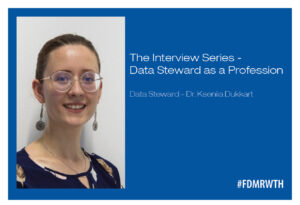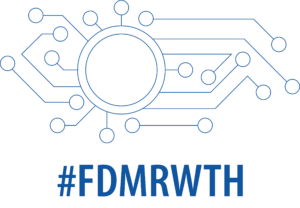Today, we would like to follow up on the series “What does a data steward actually do?” with a new interview under the title “Data Stewards at RWTH Aachen – Interview With […]”. You can find the previous interviews on the RDM blog.
The concept of data stewards is still abstract for many people. Therefore, it is best to show their specific work so that you, as readers of the RDM blog, can get a better idea of what they do. Dr. Kseniia Dukkart is available for today’s interview. We hope you enjoy reading it.
MS. Dukkart, What Is Your Role as a Data Steward at RWTH Aachen University?
Since April 2023, I have been working as a 50% data steward at RWTH Aachen University. In my role, I supervise the Collaborative Research Center Transregio 219 “Mechanisms of Cardiovascular Complications in Chronic Kidney Disease” (SFB/TRR219), which is based at the University Hospital of RWTH Aachen (UKA) and the University of Saarland (Homburg).
I spend the other half of my working hours at the IT Center of RWTH Aachen University, where I am a member of the Research Data Management team (RDM). This combination means that many tasks from both areas are closely interwoven and that there is a good mutual exchange.
Can You Describe Your Current Tasks as a Data Steward? What Specific Tasks Do You Have?
My main tasks as a data steward include the following:
- Organizing RDM events: I plan and conduct workshops and user meetings (such as the user meeting for Electronic Lab Books (ELN)). I also regularly hold consultations to deepen the RDM knowledge of those involved in the SFB/TRR219.
- Individual consultation: After the general RDM training sessions, I regularly receive messages from many colleagues asking for individual advice. I help to solve specific RDM problems that arise in the respective research groups.
- Creation of data management plans (DMPs): I develop DMPs for the projects of the SFB/TRR219 to ensure data organization and preservation.
- Development of standard operating procedures (SOPs): I help to create SOPs for the structured handling of in vivo, in vitro and human sample data.
- Creation of newsletters: The monthly RDM newsletters cover topics such as data structure, version control and FAIR principles.
- Update of the SFB/TRR219 website: The aim is to make information about good and sustainable RDM in SFB/TRR219 easy to find.
What Are the Particular Challenges of Your Work as a Data Steward?
One of the biggest challenges is that I only joined the SFB/TRR219 team in the second funding phase. This means that many work processes are already established. Furthermore, the SFB/TRR219 is located in both Aachen and Homburg, which makes it difficult to use a common technical infrastructure.
As a result, some organizational measures that we can implement in Aachen cannot yet be realized in the same way in Homburg. One example of this is the ELN eLabJournal: the members in Homburg do not have access to the local UKA instance. Setting up a separate instance would be costly and not very useful since there is no way to share the data outside of Homburg.
Furthermore, there are technical hurdles to the introduction of eLabJournal at the UKA. Not all laboratories have the necessary technical equipment, which is why we are trying to organize user meetings between different SFBs. This promotes the exchange of ideas for solving these technical deficits.
Another challenge in my work is the collaboration with the various institutes and the different working methods within a CRC that come with it. I am confronted with completely new topics – such as data protection aspects regarding patient and personal data or programming with Python.
What Do You Like About the Position?
I particularly appreciate the opportunity to constantly take on new challenges and learn new things. The work is never monotonous; I am always tackling new tasks and facing new challenges. Another plus is the excellent team – that’s very important to me.
Finally, what motivated you to apply for the role of data steward? Please describe the highlights of your previous career to show how diverse a background a data steward can have.
My motivation for working as a data steward comes from my scientific background: I worked as a scientist in the field of telemedicine and cybernetics with ECG devices and examined differences in the entropy of ECG indicators in healthy and sick people in Ukraine.
Although scientific work in Ukraine and Germany differs, my technical background has helped me to better understand work processes. The position of Data Steward is therefore very close to science, which I like.
Ms. Dukkart, thank you very much for this fascinating interview!
—–
Note
Data Stewards are employed and financed by third-party funded projects. Are you interested in a Data Steward position at your institute? Then contact the RDM team for more information!
Responsible for the content of this article are Dr. Kseniia Dukkart and Katharina Grünwald.






Leave a Reply
You must be logged in to post a comment.